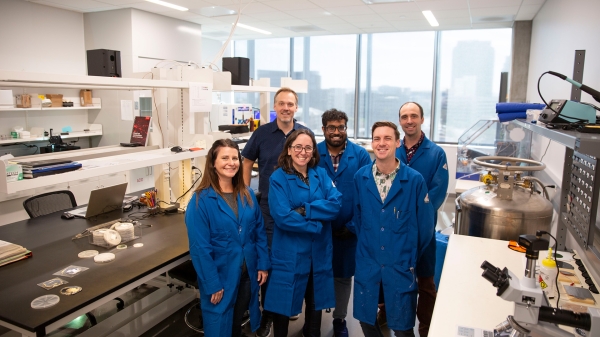ASU professor honored with prestigious award for being a cybersecurity trailblazer

Gail-Joon Ahn (left) works with a colleague in his office. Ahn is a professor of computer science and engineering in the School of Computing and Augmented Intelligence, part of the Ira A. Fulton Schools of Engineering at Arizona State University. He recently received the ACM SIGSAC Outstanding Contributions Award to recognize his pioneering work in the cybersecurity community. Photographer: Nora Skrodenis/ASU
At first, he thought it was a drill.
On Sept. 11, 2001, Gail-Joon Ahn sat in a conference room in Fort Meade, Maryland. The cybersecurity researcher was part of a group that had been invited to a meeting at the headquarters of the National Security Agency, or NSA, where they expected to brief leaders on future challenges in computer security.
As the images of the terrorist attacks against the nation that day began to play out on the room’s television screens, the academics were confused. Was this an exercise they were being invited to analyze? But when a military leader was evacuated from the room and the researchers were sequestered in a nearby hotel, Ahn understood that life had suddenly changed.
The need to better secure everything, from airports to data ports, came into sharp focus.
That same year, Ahn took up a position as information director of the Special Interest Group on Security, Audit and Control, or SIGSAC, part of the Association for Computing Machinery, or ACM, the world’s largest association for computer industry professionals.
“Back then, it seemed clear to me that we all really needed to work together,” Ahn says. “SIGSAC is an active community of highly skilled computer security professionals all sharing their expertise.”
Ahn is a professor of computer science and engineering in the School of Computing and Augmented Intelligence, part of the Ira A. Fulton Schools of Engineering at Arizona State University. In October, he received the ACM SIGSAC Outstanding Contributions Award to recognize his pioneering research and outstanding leadership in the cybersecurity community.
The honor was presented at the ACM Conference on Computer and Communications Security in Salt Lake City. The event is a global gathering point for academics, industry partners and students.
As part of his work for SIGSAC, Ahn has helped organize conferences, chaired committees that reviewed cybersecurity research papers and assisted with the publication of numerous professional journals, all with the goal of giving researchers opportunities to collaborate.
Securing success
The new award is the latest in a series of accolades for Ahn.
In 2023, he was named a fellow of the Institute of Electrical and Electronics Engineers, or IEEE. Ahn is a past recipient of the Early Career Research Award from the U.S. Department of Energy, has been granted numerous patents for his cybersecurity innovations and is an ACM Distinguished Member.
Ross Maciejewski, director of the School of Computing and Augmented Intelligence, says that Ahn’s Outstanding Contributions Award is well-deserved.
“This new award is a special validation of Gail-Joon Ahn’s efforts,” Maciejewski says. “He truly is a trailblazer who has created paths and inroads that others can take to achieve success.”
More Science and technology

ASU student researchers get early, hands-on experience in engineering research
Using computer science to aid endangered species reintroduction, enhance software engineering education and improve semiconductor material performance are just some of the ways Arizona State…

Training stellar students to secure semiconductors
In the wetlands of King’s Bay, Georgia, the sail of a nuclear-powered Trident II Submarine laden with sophisticated computer equipment juts out of the marshy waters. In a medical center, a cardiac…

ASU startup Crystal Sonic wins Natcast pitch competition
Crystal Sonic, an Arizona State University startup, won first place and $25,000 at the 2024 Natcast Startup Pitch Competition at the National Semiconductor Technology Center Symposium, or NSTC…
